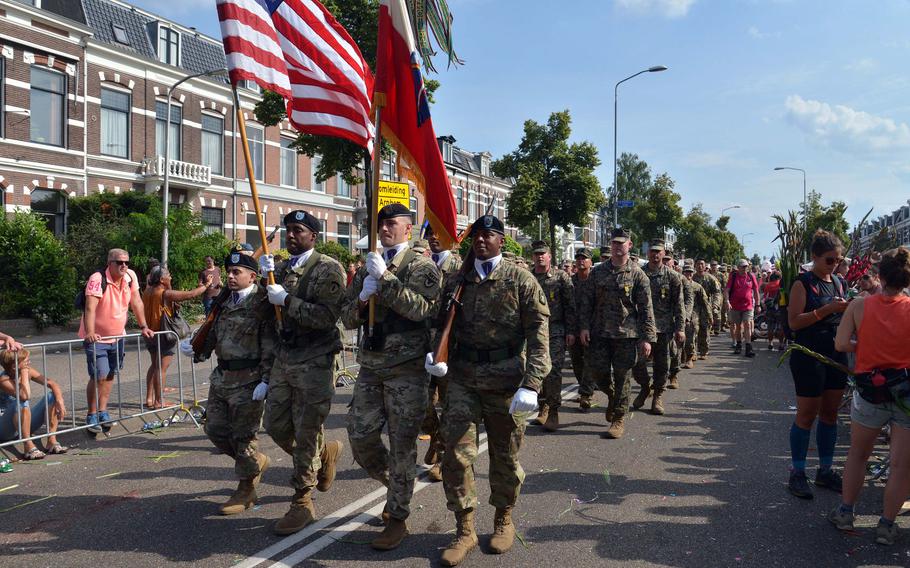
The U.S. contingent marches toward the finish line of the Nijmegen Four Days Marches behind a U.S. Army Europe color guard, Friday, July 19, 2019. (Michael Abrams/Stars and Stripes)
NIJMEGEN, Netherlands – There was some limping. There was a little stiffness and some pain. But mostly there was celebration and relief as hundreds of happy but footsore U.S. servicemembers marched up Sint Annastraat, finishing the 103rd Nijmegen Four Days Marches on Friday.
About 450 U.S. servicemembers were among the nearly 6,000 military marchers and more than 40,000 civilians from around the world who marched 100 miles in four days in and around the Dutch city of Nijmegen.
Servicemembers hiked about 25 miles a day, either in teams of 11 or more or as individuals. At the end of the four days, they receive the royally approved Vierdaagsekruis, or Four Days Cross medal.
The Viertaagse, as the Dutch call it, first took place in 1909 and was founded by the country’s physical education league. It has only been postponed by war and was called off once because of an extreme heat wave in 2006.
Militaries marching together Camaraderie is high on the list of what troops found appealing about the trek through the Dutch countryside. It’s not unusual to see individuals from different militaries marching together.
“Where else can you do this?” asked Staff Sgt. Alfredo Gutierrez, from Volkel Air Base, Netherlands, as he rested on the third day of the march in Milsbeek. “Banding with your brothers and sisters. It’s a once in a lifetime experience.”
Mike Walley, a retired airman who lives nearby and is the U.S. logistics support officer for the event, and his wife, Carla, along with a couple of volunteers, were serving lunch to hungry marchers at Milsbeek.
Walley compared the Four Days Marches to the Seoul Olympics, where he had volunteered. “Except here, everybody wins a medal.”
Walley, who runs the U.S. military registration for the march and its website, said the U.S. military gets less command support for the march than other militaries and could use more.
He said he asked “USAREUR for 40 medics and got 21.” Along with a color guard for Friday’s parade in town, that was about all U.S. Army Europe could provide, he said.
“I wish we could get more support for this from the higher-ups,” Sgt. 1st Class Joshua Williams, 5th Military Police Battalion, from Kaiserslautern, said as he examined his feet at a rest stop. “Without help from some of the other countries, we might have some problems out here.”
Blisters and beer One of the 21 U.S. medics there was Spc. Andrew Zaranko, of the 2nd Cavalry Regiment’s Regimental Support Squadron of Vilseck, Germany.
Zaranko, who worked almost nonstop as the U.S. troops rolled through a rest area in Grassel on the last day of the march, said he had tended to a lot of blisters and hot spots, but mostly just “worn away feet,” as he put it.
By the fourth day, almost everyone complained of some aches and pains. Gutierrez, the staff sergeant from Volkel, said he felt tingling in his feet and bones, while Williams was bothered by a bad toenail.
After leaving Grassel, little more than half way to the finish line in Nijmegen, U.S. troops noted that Beers was the next town to march through. “There’s got to be beer in Beers!” was heard more than once as they moved out.
As they marched through town, where the music was blaring and the beer was indeed flowing, they traded high-fives and fist-bumps with the kids lining the streets. In the end, they passed up the beer.
One of the great things about the Viertaagse is seeing how involved the Dutch are, said Capt. Jonathan Janos, who is stationed in Stuttgart, Germany, and is on his third march. “Everybody is either marching or partying. It’s almost like Mardi Gras.”
After receiving their medals at a rest stop outside of Nijmegen, the servicemembers marched with the other tens of thousands up Sint Annastraat to the applause of thousands of spectators lining the way.
Walking stronger than when he left the Grassel stop, Williams, the MP from Kaiserslautern, was asked if he had been sure he would finish the 100 miles. “Never a doubt, sir!” he replied.
He made his way, along with his comrades, to the finish line and a well-deserved beer.